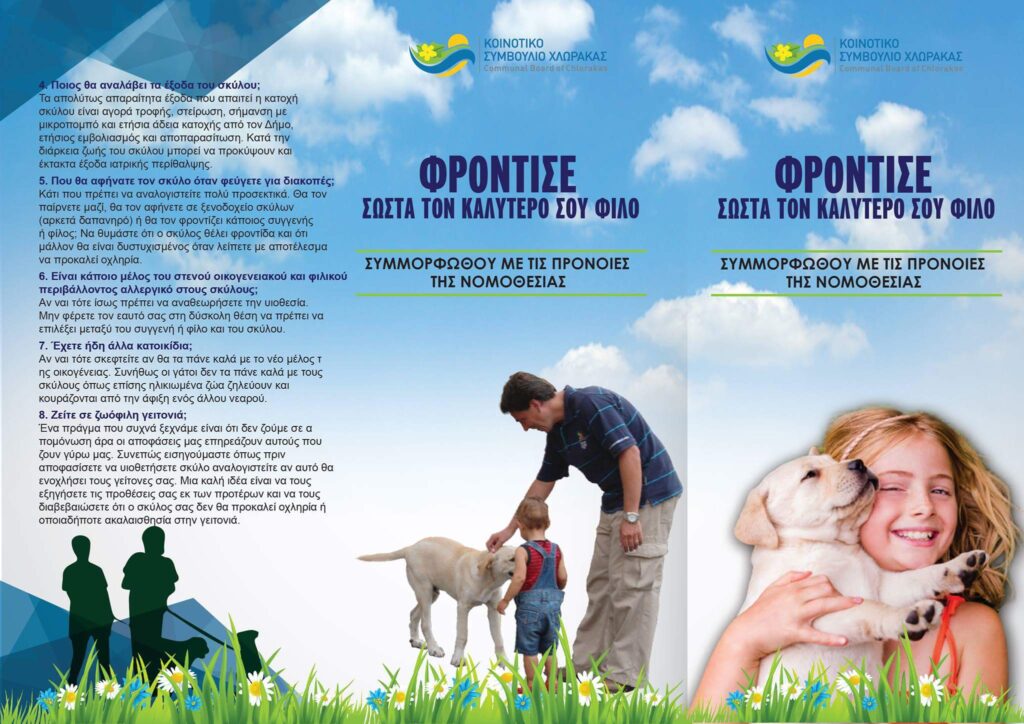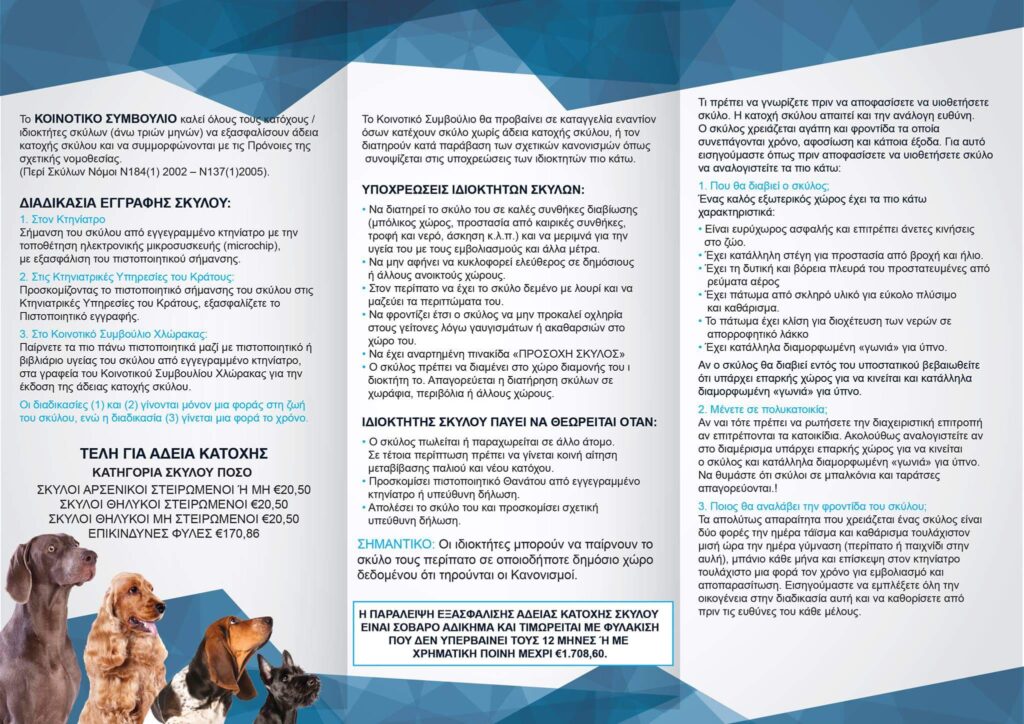Dogs
Take Good Care of Your Best Friend and Comply with the Provisions of the Law
The Community Council calls on all dog owners (over three months old) to obtain a dog ownership license and comply with the provisions of the relevant legislation.
(Dog Laws N184(1) 2002 – N137(1) 2005)
DOG REGISTRATION PROCEDURE:
At the Veterinarian:
Microchip the dog by a registered veterinarian, obtaining a microchip certification.At the State Veterinary Services:
Present the dog’s microchip certificate to the State Veterinary Services to obtain the registration certificate.At the Chloraka Community Council:
Bring the above certificates along with a health certificate or health booklet from a registered veterinarian to the Chloraka Community Council offices to issue the dog ownership license.
The procedures (1) and (2) are only done once in the dog’s lifetime, while procedure (3) is done once a year.
DOG CATEGORY AND FEES:
| DOG CATEGORY | AMOUNT (€) |
|---|---|
| Male dogs (sterilized or not) | 20.50 |
| Female dogs (sterilized) | 20.50 |
| Female dogs (not sterilized) | 20.50 |
| Dangerous breeds | 170.86 |
A DOG OWNER IS NO LONGER CONSIDERED AS SUCH WHEN:
- The dog is sold or transferred to another person. In this case, a joint application for transfer must be made by the old and new owner.
- A death certificate from a registered veterinarian or a responsible statement is submitted.
- The dog is lost, and a relevant responsible statement is submitted.
OBLIGATIONS OF DOG OWNERS:
- Keep the dog in good living conditions (ample space, protection from weather conditions, food and water, exercise, etc.) and ensure its health through vaccinations and other measures.
- Do not allow the dog to roam freely in public or open spaces.
- Keep the dog on a leash during walks and clean up after it.
- Ensure that the dog does not cause disturbances to neighbors due to barking or waste in its area.
- Display a “WARNING DOG” sign.
- The dog must reside in the owner’s home. Keeping dogs in fields, gardens, or other areas is prohibited.
IMPORTANT: Owners can take their dogs for walks in any public space provided the regulations are followed.
The Community Council will file complaints against those who keep a dog without a dog ownership license or violate the relevant regulations summarized above in the owners’ obligations.
Failure to obtain a dog ownership license is a serious offense punishable by imprisonment of up to 12 months or a monetary fine of up to €1,708.60.
What You Should Know Before Deciding to Adopt a Dog
Owning a dog requires responsibility. Dogs need love and care, which involve time, commitment, and some expenses. Therefore, we recommend that before you decide to adopt a dog, consider the following:
Where Will the Dog Live?
A good outdoor space has the following characteristics:- Spacious and safe, allowing comfortable movement for the animal.
- Has suitable shelter for protection from rain and sun.
- The west and north sides should be protected from drafts.
- The floor should be made of durable material for easy cleaning.
- The floor should slope for water drainage to a soakaway.
- Has a properly designed “corner” for sleeping.
If the dog will live indoors, ensure there is enough space for movement and a properly designed “corner” for sleeping.
Do You Live in an Apartment?
If yes, check with the management committee if pets are allowed. Then, consider if there is enough space in the apartment for the dog to move and a properly designed “corner” for sleeping. Remember, dogs on balconies and rooftops are prohibited!Who Will Take Care of the Dog?
Essential needs for a dog include feeding twice a day and at least half an hour of exercise (walk or play in the yard), a bath once a month, and a veterinary visit at least once a year for vaccinations and deworming. We recommend involving the whole family in this process and defining each member’s responsibilities in advance.Who Will Cover the Expenses for the Dog?
Essential expenses for dog ownership include purchasing food, spaying/neutering, microchipping, and an annual ownership license from the municipality, as well as annual vaccinations and deworming. During the dog’s lifetime, unexpected medical expenses may also arise.Where Will You Leave the Dog When You Go on Vacation?
Consider this carefully. Will you take the dog with you, leave it at a dog hotel (which can be quite expensive), or have a relative or friend take care of it? Remember that the dog needs care and may become unhappy when you are away, resulting in disturbances.Is Anyone in Your Close Family or Friend Group Allergic to Dogs?
If yes, you may need to reconsider the adoption. Don’t put yourself in a position to choose between a relative or friend and the dog.Do You Already Have Other Pets?
If yes, consider whether they will get along with the new family member. Usually, cats do not get along well with dogs, and older pets may feel jealous or stressed by the arrival of a younger one.Do You Live in a Pet-Friendly Neighborhood?
One thing we often forget is that we do not live in isolation; our decisions affect those around us. Therefore, we recommend that before you decide to adopt a dog, consider whether this will disturb your neighbors. A good idea is to explain your intentions to them in advance and assure them that your dog will not cause disturbances or mess in the neighborhood.


